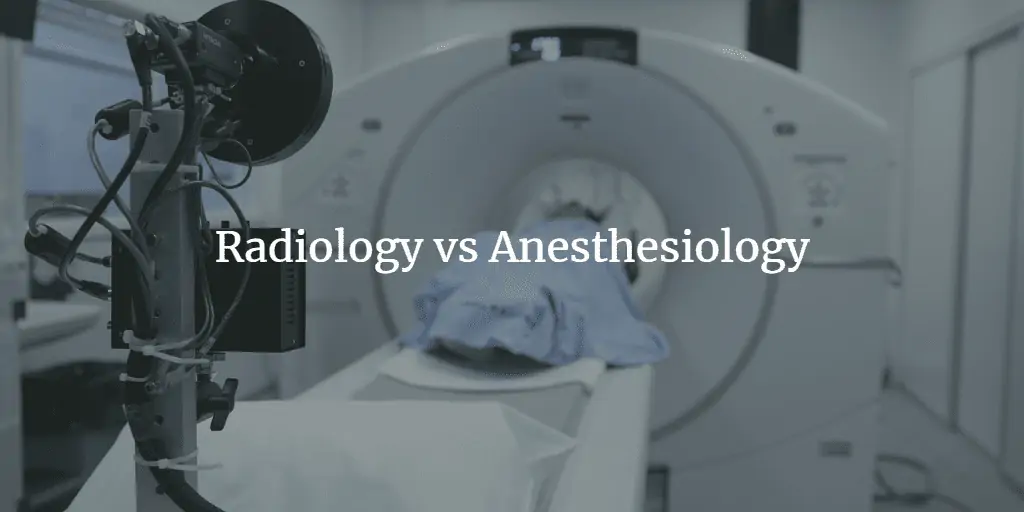Which course is the best, radiology vs anesthesiology? Choosing a career/specialization in medicine could be one hell of a task. What do I mean?
People, especially students, find it hard to choose a particular discipline in the medical field. This happens mainly when you do not know the sub-disciplines in view.
For this article, I will explore these fields and what they entail. Students can make better decisions about these career options when they thoroughly understand them.
This is simple logic. This article will answer the differences between anesthesiology and radiology and the Salary Information.
What is Radiology?
As a Medical student, you should be aware that Medicine has a lot of sub-disciplines, just like many other fields like Engineering, Law, etc. Radiology is one of those sub-disciplines, and it is a unique one.

It is a specialty of medicine whereby diseases are diagnosed using images of the internal body, organs, and systems. These images are captured using special devices and are interpreted for disease management and treatment administration.
Contrary to the opinion of many, Radiologists are also Medical Doctors. Yes, they are trained Medical professionals with the knowledge and understanding to interpret medical images from Radio Examinations.
A radiologist is not responsible for handling the equipment to capture medical images. This is the job of a Radiographer or Radiology Technologist. It is the responsibility of Radiologists to interpret these images and proffer solutions.
As I said earlier, every sub-discipline of Medicine is very important. Radiology is vital for all healthcare sectors, including surgery, pediatrics, obstetrics, gynecology, oncology, emergency medicine, infectious diseases, etc.
- Physician Assistant vs Physical Therapist
- Do Medical Schools Require Calculus?
- Jesuit Medical Schools Requirements, Fees & Programs
What is Anesthesiology?

Yet another sub-discipline of Medicine, Anesthesiology, is concerned with the total perioperative care of patients before, during, and after surgical processes. It is also known as Anesthesia and encompasses anesthesia, intensive care, emergency, and pain medicine.
A professional who practices Anesthesiology is known as an Anesthesiologist. He/she is also a Medical Doctor/Physician.
In 9 out of every ten surgical procedures, Anesthesiologists are involved. This shows how useful and important they are in the operation theater. So, what are the major duties of Anesthesiologists? We will find out in the next section.
Radiologist vs. Anesthesiologist: The Differences

So what are the differences between radiology and anesthesiology?
Radiologist Responsibilities
- A Radiologist acts as an expert/Specialist consultant to the Physician who has referred the patient to the Radiology department.
- He/She can treat diseases using radiation methods (A very good example is chemotherapy for cancer treatment).
- A Radiologist is also responsible for comparing medical image reports to other medical tests and examinations to point out a connection.
- Recommend further examinations or treatments to patients and rub minds with the referring Physicians.
- In addition, a Radiologist should also guide and direct the Radiology Technologists responsible for operating the equipment used to carry out radiological imaging.
Anesthesiologist Responsibilities
Pre-Surgery
The duty of an Anesthesiologist will begin even before the surgery. He has to make a perioperative evaluation of the patient before going into surgery.
The patient might be asked questions about his/her Medical history, as this will help determine how anesthesia will be administered. This ensures the surgery is successful and that no little mistake puts everything at risk.
During Surgery
The Anesthesiologist will;
- Provide continual medical assessment of the patient in surgery
- Regularly monitor and control the patient’s vital life functions, such as the heartbeat rate and rhythm, overall body temperature, breathing, blood pressure, and body fluid balance
- Administering medications to help reduce the patient’s pain and control the level of consciousness during the surgery is safe and successful.
Post-Surgery
There is still more work to be done after surgery. Immediately after surgery, the patients are taken to the Post Anesthesia Care Unit or Intensive Care Unit, where they will be administered medications to help relieve the surgery pains.
In this unit, other specialized nurses, Anesthesiologists, and physicians will continue to monitor the patient’s condition and vital signs.
Radiologist vs. Anesthesiologist salary
Radiologists receive over $344,970 annually. Those who work in private institutions get paid even higher than this.
An Anesthesiologist can make as much as $393,215 annually. This is a little less than the amount that a Radiologist will make in the same period.
Radiology vs. Anesthesiology: Which is better?
I have received several questions from students asking me which is better, Radiology or Anesthesiology. I believe the differences between the two are now very clear. A Radiologist works in a Radiology department. Anesthesiologist works in a clinical setting and an Operation theater.
However, both careers are good and interrelated to one. There isn’t any better than the other. Suppose you are interested in going for Radiology. In that case, I have given you more reasons to, and if you are interested in Anesthesiology, I have also given you reasons to get more keen on your interest.
If you want to become a radiologist or an anesthesiologist, you must attend Medical school. You must obtain an MD degree, specialized training during the program, or residency.
It all depends on where you want to study. If you ask which is harder to study, I will say Radiology. Compared to Anesthesiology, Radiology is quite complex, given that you will be involved in Radiation calculations and the like.
Anesthesiology seems easier than Radiology, but you should expect it also to have its perks. I believe this is one of the reasons why Radiologists are paid higher than Anesthesiologists.
In addition, dangers are associated with being a Radiologist, such as exposure to radiation. This is why these specialists are trained to handle the equipment and maintain safety for everyone in the Radiology lab. On the other hand, Anesthesiology involves lesser risk.


So nice I wanna select anesthesia as a career